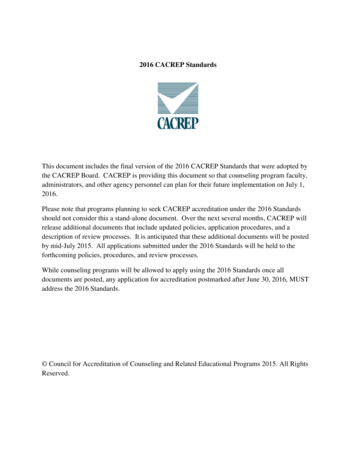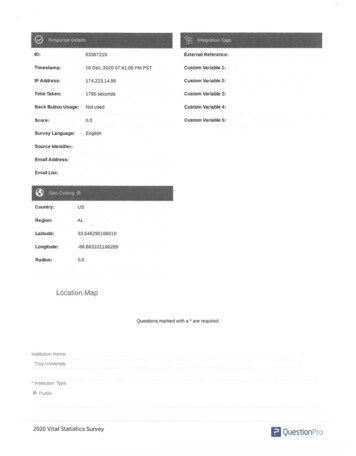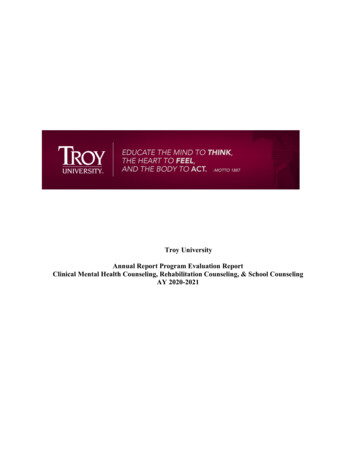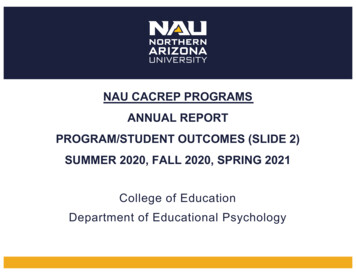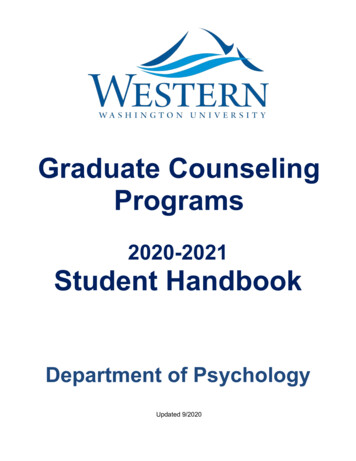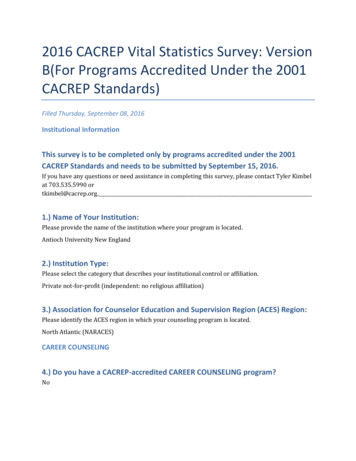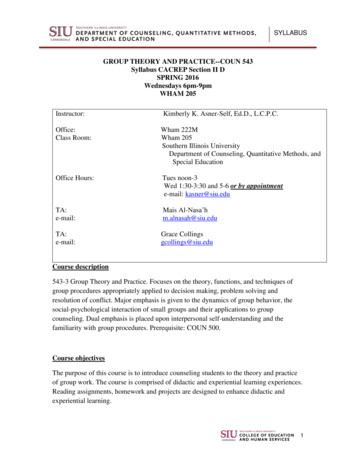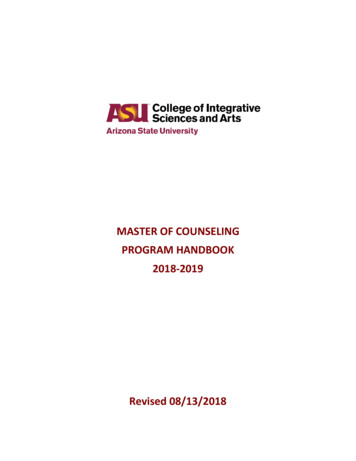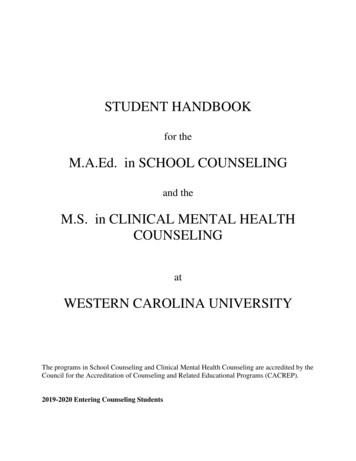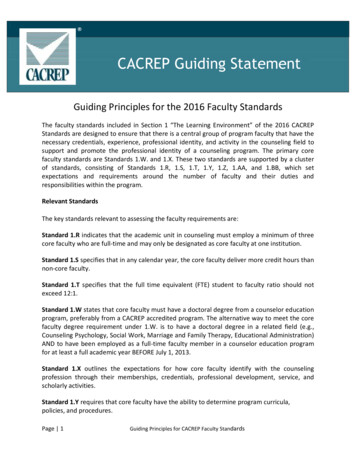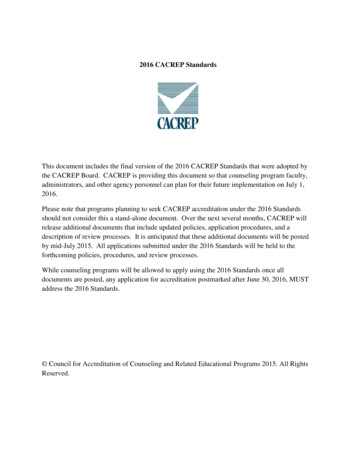
Transcription
2016 CACREP StandardsThis document includes the final version of the 2016 CACREP Standards that were adopted bythe CACREP Board. CACREP is providing this document so that counseling program faculty,administrators, and other agency personnel can plan for their future implementation on July 1,2016.Please note that programs planning to seek CACREP accreditation under the 2016 Standardsshould not consider this a stand-alone document. Over the next several months, CACREP willrelease additional documents that include updated policies, application procedures, and adescription of review processes. It is anticipated that these additional documents will be postedby mid-July 2015. All applications submitted under the 2016 Standards will be held to theforthcoming policies, procedures, and review processes.While counseling programs will be allowed to apply using the 2016 Standards once alldocuments are posted, any application for accreditation postmarked after June 30, 2016, MUSTaddress the 2016 Standards. Council for Accreditation of Counseling and Related Educational Programs 2015. All RightsReserved.
Table of ContentsINTRODUCTION TO THE 2016 CACREP STANDARDS . 3SECTION 1: THE LEARNING ENVIRONMENT. 5THE INSTITUTION . 5THE ACADEMIC UNIT. 6FACULTY AND STAFF . 7SECTION 2: PROFESSIONAL COUNSELING IDENTITY . 9FOUNDATION . 9COUNSELING CURRICULUM . 9SECTION 3: PROFESSIONAL PRACTICE . 14ENTRY-LEVEL PROFESSIONAL PRACTICE . 14PRACTICUM . 14INTERNSHIP . 15SUPERVISOR QUALIFICATIONS. 15PRACTICUM AND INTERNSHIP COURSE LOADS . 16SECTION 4: EVALUATION IN THE PROGRAM . 17EVALUATION OF THE PROGRAM . 17ASSESSMENT OF STUDENTS . 17EVALUATION OF FACULTY AND SUPERVISORS . 18SECTION 5: ENTRY-LEVEL SPECIALTY AREAS . 19A.ADDICTION COUNSELING. 19B.CAREER COUNSELING . 21C.CLINICAL MENTAL HEALTH COUNSELING . 23D.CLINICAL REHABILITATION COUNSELING. 25E.COLLEGE COUNSELING AND STUDENT AFFAIRS . 28F.MARRIAGE, COUPLE, AND FAMILY COUNSELING . 30G.SCHOOL COUNSELING . 32SECTION 6: DOCTORAL STANDARDS . 34A.THE DOCTORAL LEARNING ENVIRONMENT. 34B.DOCTORAL PROFESSIONAL IDENTITY . 35C.PRACTICUM AND INTERNSHIP . 38GLOSSARY TO ACCOMPANY THE 2016 CACREP STANDARDS . 392
INTRODUCTION TO THE 2016 CACREP STANDARDSCACREP accreditation is both a process and a status. Institutional application for CACREPaccreditation denotes a commitment to program excellence. The accreditation processincorporates programs’ self-assessment along with external review to determine if and howprogram standards are being met. Accredited status indicates to the public at large that a programis fulfilling its commitment to educational quality.The 2016 CACREP Standards were written with the intention to simplify and clarify theaccreditation requirements. An intentional effort was made to avoid redundancy and confusinglanguage. The lack of multiple references to any particular content area was not meant todiscount the importance of any of those content areas. At minimum, programs must address allrequired content, but they may choose the level of emphasis placed on each content area.The 2016 CACREP Standards were also written with the intent to promote a unified counselingprofession. Requirements are meant to ensure that students graduate with a strong professionalcounselor identity and with opportunities for specialization in one or more areas. The Standardsrequire that graduates demonstrate both knowledge and skill across the curriculum as well asprofessional dispositions.Although the 2016 CACREP Standards delineate accreditation requirements, they do not dictatethe manner in which programs may choose to meet standards. Program innovation is encouragedin meeting both the intent and spirit of the 2016 CACREP Standards. Program faculty andreviewers should understand that counselor education programs can meet the accreditationrequirements in a variety of ways. Providing evidence of meeting or exceeding the standards isthe responsibility of the program.Graduates of CACREP-accredited programs are prepared for careers in mental health, humanservices, education, private practice, government, military, business, and industry. Entry-levelprogram graduates are prepared as counseling practitioners, and for respective credentials (e.g.,licensure, certification) in their specialty area. Doctoral-level graduates are prepared forcounselor education, supervision, and practice.The 2016 CACREP Standards are organized into six sections. Section 1, The LearningEnvironment, includes standards pertaining to the institution, the academic unit, and programfaculty and staff. Section 2, Professional Counseling Identity, includes foundational standardsand the counseling curriculum, comprising the eight required core content areas. Section 3,Professional Practice, refers to standards required for entry-level practice, practicum, internship,supervisor qualifications, and practicum and internship course loads. Section 4, Evaluation in theProgram, provides standards relevant to evaluation of the program, assessment of students, andevaluation of faculty and site supervisors. Section 5, Entry-Level Specialty Areas, providesstandards relevant to specialty areas offered by the program. These include addictions; career;clinical mental health; clinical rehabilitation; college counseling and student affairs; marriage,3
couple, and family; and school counseling. For each specialty area, standards pertaining tofoundations, contextual dimensions and practice are provided. Section 6 contains the DoctoralStandards for Counselor Education and Supervision, including learning environment,professional identity, and doctoral-level practicum and internship requirements. In addition to the2016 Standards, a Glossary, defining key terms within the 2016 CACREP Standards document isavailable.4
SECTION 1: THE LEARNING ENVIRONMENTThe following Standards apply to all entry-level and doctoral-level programs for whichaccreditation is being sought unless otherwise specified.THE INSTITUTIONA.The academic unit is clearly identified as part of the institution’s graduate degreeofferings and has primary responsibility for the preparation of students in the program. Ifmore than one academic unit has responsibility for the preparation of students in theprogram, the respective areas of responsibility and the relationships among and betweenthem must be clearly documented.B.The institutional media accurately describe the academic unit, the core counseloreducation program faculty, and each program and specialty area offered, includingadmissions criteria, accreditation status, methods of instruction, minimum degreerequirements, matriculation requirements, and financial aid information.C.The institution is committed to providing the program with sufficient financial support toensure continuity, quality, and effectiveness in all of the program’s learningenvironments.D.The institution provides opportunities for graduate assistantships for program studentsthat are commensurate with graduate assistantship opportunities in other clinicalprograms in the institution.E.The institution provides support for counselor education program faculty to participate inprofessional activities, scholarly activities, and service to the profession.F.The institution provides learning resources appropriate for scholarly inquiry, study, andresearch relevant to counseling and accessible by all counselor education program facultyand students.G.The institution provides technical support to all counselor education program faculty andstudents to ensure access to information systems for learning, teaching, and research.H.The institution provides information to students in the program about personal counselingservices provided by professionals other than counselor education program faculty andstudents.I.The institution provides adequate and appropriate access to counseling instructionenvironments (on or off campus) that are conducive to training and supervision ofindividual and group counseling. The counseling instruction environments includetechnologies and other observational capabilities as well as procedures for maintainingprivacy and confidentiality.5
THE ACADEMIC UNITJ.Entry-level degree specialty areas in Addiction Counseling; Clinical Mental HealthCounseling; Clinical Rehabilitation Counseling; and Marriage, Couple, and FamilyCounseling consist of approved, graduate-level study with a minimum of 60 semestercredit hours or 90 quarter credit hours required of all students. Until June 30, 2020,Career Counseling, College Counseling and Student Affairs, and School Counselingspecialty areas require a minimum of 48 semester hours or 72 quarter hours. BeginningJuly 1, 2020, all entry-level degree programs require a minimum of 60 semester credithours or 90 quarter credit hours for all students.K.The academic unit makes continuous and systematic efforts to attract, enroll, and retain adiverse group of students and to create and support an inclusive learning community.L.Entry-level admission decision recommendations are made by the academic unit’sselection committee and include consideration of each applicant’s (1) relevance of careergoals, (2) aptitude for graduate-level study, (3) potential success in forming effectivecounseling relationships, and (4) respect for cultural differences.M.Before or at the beginning of the first term of enrollment in the academic unit, theprogram provides a new student orientation during which a student handbook isdisseminated and discussed, students’ ethical and professional obligations and personalgrowth expectations as counselors-in-training are explained, and eligibility forlicensure/certification is reviewed.N.The student handbook includes (1) the mission statement of the academic unit andprogram objectives, (2) information about professional counseling organizations,opportunities for professional involvement, and activities appropriate for students, (3)matriculation requirements, (4) expectations of students, (5) academic appeal policy, (6)written endorsement policy explaining the procedures for recommending students forcredentialing and employment, and (7) policy for student retention, remediation, anddismissal from the program.O.Counselor education programs have and follow a policy for student retention,remediation, and dismissal from the program consistent with institutional due processpolicies and with the counseling profession’s ethical codes and standards of practice.P.Students in entry-level programs have an assigned advisor at all times during the programwho helps them develop a planned program of study.Q.The academic unit makes continuous and systematic efforts to recruit, employ, and retaina diverse faculty to create and support an inclusive learning community.R.The academic unit has faculty resources of appropriate quality and sufficiency to meetthe demands of the program. For entry-level programs, the academic unit must employ aminimum of three full-time core counselor education program faculty members who6
teach in the entry-level program. Core counselor education program faculty may only bedesignated as core faculty at one institution.S.To ensure that students are taught primarily by core counselor education program faculty,for any calendar year, the combined number of course credit hours taught by non-corefaculty must not exceed the number of credit hours taught by core faculty.T.For any calendar year, the ratio of full-time equivalent (FTE) students to FTE facultyshould not exceed 12:1.U.The teaching and advising loads, scholarship, and service expectations of counseloreducation program faculty members are consistent with the institutional mission and therecognition that counselor preparation programs require extensive clinical instruction.V.Clerical assistance is available to support faculty/program activities and is commensuratewith that provided for similar graduate programs.FACULTY AND STAFFW.Core counselor education program faculty have earned doctoral degrees in counseloreducation, preferably from a CACREP-accredited program, or have related doctoraldegrees and have been employed as full-time faculty members in a counselor educationprogram for a minimum of one full academic year before July 1, 2013.X.Core counselor education program faculty identify with the counseling profession (1)through sustained memberships in professional counseling organizations, (2) through themaintenance of certifications and/or licenses related to their counseling specialty area(s),and (3) by showing evidence of sustained (a) professional development and renewalactivities related to counseling, (b) professional service and advocacy in counseling, and(c) research and scholarly activity in counseling commensurate with their faculty role.Y.Within the structure of the institution’s policies, the core counselor education programfaculty have the authority to determine program curricula and to establish operationalpolicies and procedures for the program.Z.Non-core faculty may be employed who support the mission, goals, and curriculum of thecounselor education program. They must have graduate or professional degrees in a fieldthat supports the mission of the program.AA.The core counselor education program faculty orient non-core faculty to program andaccreditation requirements relevant to the courses they teach.BB.All core and non-core counselor education program faculty have relevant preparation andexperience in relation to the courses they teach.CC.A core counselor education program faculty member is clearly designated as theacademic unit leader for counselor education; this individual must have a written jobdescription that includes (1) having responsibility for the coordination of the counseling7
program(s), (2) responding to inquiries regarding the overall academic unit, (3) providinginput and making recommendations regarding the development of and expenditures fromthe budget, (4) providing or delegating year-round leadership to the operation of theprogram(s), and (5) receiving release time from faculty member responsibilities toadminister the academic unit.DD.A program faculty member or administrator is identified as the practicum and internshipcoordinator for the academic unit and/or program; this individual must have a written jobdescription that includes (1) having responsibility for the coordination of practicum andinternship experiences in designated counselor education program(s), and (2) respondingto inquiries regarding practicum and internship.8
SECTION 2: PROFESSIONAL COUNSELING IDENTITYThe following Standards apply to all entry-level and doctoral-level programs for whichaccreditation is being sought unless otherwise specified.FOUNDATIONA.The counselor education program has a publicly available mission statement and programobjectives.B.The program objectives (1) reflect current knowledge and projected needs concerningcounseling practice in a multicultural and pluralistic society; (2) reflect input from allpersons involved in the conduct of the program, including counselor education programfaculty, current and former students, and personnel in cooperating agencies; (3) addressstudent learning; and (4) are written so they can be evaluated.C.Students actively identify with the counseling profession by participating in professionalcounseling organizations and by participating in seminars, workshops, or other activitiesthat contribute to personal and professional growth.COUNSELING CURRICULUMD.Syllabi are available for review by all enrolled or prospective students, are distributed atthe beginning of each curricular experience, and include (1) content areas, (2) knowledgeand skill outcomes, (3) methods of instruction, (4) required text(s) and/or reading(s), (5)student performance evaluation criteria and procedures, and (6) a disabilityaccommodation policy and procedure statement.E.Current counseling-related research is infused in the curriculum.F.The eight common core areas represent the foundational knowledge required of all entrylevel counselor education graduates. Therefore, counselor education programs mustdocument where each of the lettered standards listed below is covered in the curriculum.1. PROFESSIONAL COUNSELING ORIENTATION AND ETHICAL PRACTICEa. history and philosophy of the counseling profession and its specialty areasb. the multiple professional roles and functions of counselors across specialty areas, andtheir relationships with human service and integrated behavioral health care systems,including interagency and interorganizational collaboration and consultationc. counselors’ roles and responsibilities as members of interdisciplinary communityoutreach and emergency management response teamsd. the role and process of the professional counselor advocating on behalf of theprofessione. advocacy processes needed to address institutional and social barriers that impedeaccess, equity, and success for clients9
f. professional counseling organizations, including membership benefits, activities,services to members, and current issuesg. professional counseling credentialing, including certification, licensure, andaccreditation practices and standards, and the effects of public policy on these issuesh. current labor market information relevant to opportunities for practice within thecounseling professioni. ethical standards of professional counseling organizations and credentialing bodies,and applications of ethical and legal considerations in professional counselingj. technology’s impact on the counseling professionk. strategies for personal and professional self-evaluation and implications for practicel. self-care strategies appropriate to the counselor rolem. the role of counseling supervision in the profession2. SOCIAL AND CULTURAL DIVERSITYa. multicultural and pluralistic characteristics within and among diverse groupsnationally and internationallyb. theories and models of multicultural counseling, cultural identity development, andsocial justice and advocacyc. multicultural counseling competenciesd. the impact of heritage, attitudes, beliefs, understandings, and acculturativeexperiences on an individual’s views of otherse. the effects of power and privilege for counselors and clientsf. help-seeking behaviors of diverse clientsg. the impact of spiritual beliefs on clients’ and counselors’ worldviewsh. strategies for identifying and eliminating barriers, prejudices, and processes ofintentional and unintentional oppression and discrimination3. HUMAN GROWTH AND DEVELOPMENTa. theories of individual and family development across the lifespanb. theories of learningc. theories of normal and abnormal personality developmentd. theories and etiology of addictions and addictive behaviorse. biological, neurological, and physiological factors that affect human development,functioning, and behavior10
f. systemic and environmental factors that affect human development, functioning, andbehaviorg. effects of crisis, disasters, and trauma on diverse individuals across the lifespanh. a general framework for understanding differing abilities and strategies fordifferentiated interventionsi. ethical and culturally relevant strategies for promoting resilience and optimumdevelopment and wellness across the lifespan4. CAREER DEVELOPMENTa. theories and models of career development, counseling, and decision makingb. approaches for conceptualizing the interrelationships among and between work,mental well-being, relationships, and other life roles and factorsc. processes for identifying and using career, avocational, educational, occupational andlabor market information resources, technology, and information systemsd. approaches for assessing the conditions of the work environment on clients’ lifeexperiencese. strategies for assessing abilities, interests, values, personality and other factors thatcontribute to career developmentf. strategies for career development program planning, organization, implementation,administration, and evaluationg. strategies for advocating for diverse clients’ career and educational development andemployment opportunities in a global economyh. strategies for facilitating client skill development for career, educational, and lifework planning and managementi. methods of identifying and using assessment tools and techniques relevant to careerplanning and decision makingj. ethical and culturally relevant strategies for addressing career development5. COUNSELING AND HELPING RELATIONSHIPSa. theories and models of counselingb. a systems approach to conceptualizing clientsc. theories, models, and strategies for understanding and practicing consultationd. ethical and culturally relevant strategies for establishing and maintaining in-personand technology-assisted relationshipse. the impact of technology on the counseling process11
f. counselor characteristics and behaviors that influence the counseling processg. essential interviewing, counseling, and case conceptualization skillsh. developmentally relevant counseling treatment or intervention plansi. development of measurable outcomes for clientsj. evidence-based counseling strategies and techniques for prevention and interventionk. strategies to promote client understanding of and access to a variety of communitybased resourcesl. suicide prevention models and strategiesm. crisis intervention, trauma-informed, and community-based strategies, such asPsychological First Aidn. processes for aiding students in developing a personal model of counseling6. GROUP COUNSELING AND GROUP WORKa. theoretical foundations of group counseling and group workb. dynamics associated with group process and developmentc. therapeutic factors and how they contribute to group effectivenessd. characteristics and functions of effective group leaderse. approaches to group formation, including recruiting, screening, and selectingmembersf. types of groups and other considerations that affect conducting groups in variedsettingsg. ethical and culturally relevant strategies for designing and facilitating groupsh. direct experiences in which students participate as group members in a small groupactivity, approved by the program, for a minimum of 10 clock hours over the courseof one academic term7. ASSESSMENT AND TESTINGa. historical perspectives concerning the nature and meaning of assessment and testingin counselingb. methods of effectively preparing for and conducting initial assessment meetingsc. procedures for assessing risk of aggression or danger to others, self-inflicted harm, orsuicided. procedures for identifying trauma and abuse and for reporting abusee. use of assessments for diagnostic and intervention planning purposes12
f. basic concepts of standardized and non-standardized testing, norm-referenced andcriterion-referenced assessments, and group and individual assessmentsg. statistical concepts, including scales of measurement, measures of central tendency,indices of variability, shapes and types of distributions, and correlationsh. reliability and validity in the use of assessmentsi. use of assessments relevant to academic/educational, career, personal, and socialdevelopmentj. use of environmental assessments and systematic behavioral observationsk. use of symptom checklists, and personality and psychological testingl. use of assessment results to diagnose developmental, behavioral, and mental disordersm. ethical and culturally relevant strategies for selecting, administering, and interpretingassessment and test results8. RESEARCH AND PROGRAM EVALUATIONa. the importance of research in advancing the counseling profession, including how tocritique research to inform counseling practiceb. identification of evidence-based counseling practicesc. needs assessmentsd. development of outcome measures for counseling programse. evaluation of counseling interventions and programsf. qualitative, quantitative, and mixed research methodsg. designs used in research and program evaluationh. statistical methods used in conducting research and program evaluationi. analysis and use of data in counselingj. ethical and culturally relevant strategies for conducting, interpreting, and reportingthe results of research and/or program evaluation13
SECTION 3: PROFESSIONAL PRACTICEProfessional practice, which includes practicum and internship, provides for theapplication of theory and the development of counseling skills under supervision. Theseexperiences will provide opportunities for students to counsel clients who represent theethnic and demographic diversity of their community.The following Standards apply to entry-level programs for which accreditation is beingsought.ENTRY-LEVEL PROFESSIONAL PRACTICEA.Students are covered by individual professional counseling liability insurance policieswhile enrolled in practicum and internship.B.Supervision of practicum and internship students includes program-appropriateaudio/video recordings and/or live supervision of students’ interactions with clients.C.Formative and summative evaluations of the student’s counseling performance andability to integrate and apply knowledge are conducted as part of the student’s practicumand internship.D.Students have the opportunity to become familiar with a variety of professional activitiesand resources, including technological resources, during their practicum and internship.E.In addition to the development of individual counseling skills, during either thepracticum or internship, students must lead or co-lead a counseling or psychoeducationalgroup.PRACTICUMF.Students complete supervised counseling practicum experiences that total a minimum of100 clock hours over a full academic term that is a minimum of 10 weeks.G.Practicum students complete at least 40 clock hours of direct service with actual clientsthat contributes to the development of counseling skills.H.Practicum students have weekly interaction with supervisors that averages one hour perweek of individual and/or triadic supervision throughout the practicum by (1) a counseloreducation program faculty member, (2) a student supervisor who is under the supervisionof a counselor education program faculty member, or (3) a site supervisor who is workingin consultation on a regular schedule with a counselor education program faculty memberin accordance with the supervision agreement.I.Practicum students participate in an average of 1½ hours per week of group supervisionon a regular schedule throughout the practicum. Group supervision must be provided by acounselor education program faculty member or a student supervisor who is under thesupervision of a counselor education program faculty member.14
INTERNSHIPJ.After successful completion of the practicum, students complete 600 clock hours ofsupervised counseling internship in roles and s
This document includes the final version of the 2016 CACREP Standards that were adopted by the CACREP Board. CACREP is providing this document so that counseling program faculty, administrators, and other agency personnel can plan for their future implementation on July 1, 2016. Please note that programs planning to seek CACREP accreditation .
